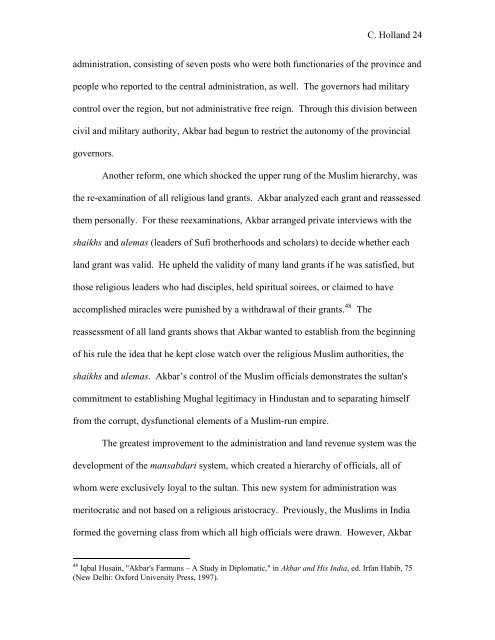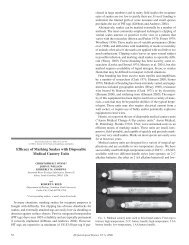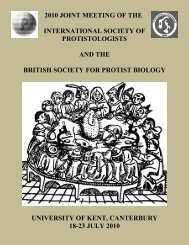Akbar and the Mughal State - University of Georgia
Akbar and the Mughal State - University of Georgia
Akbar and the Mughal State - University of Georgia
You also want an ePaper? Increase the reach of your titles
YUMPU automatically turns print PDFs into web optimized ePapers that Google loves.
C. Holl<strong>and</strong> 24<br />
administration, consisting <strong>of</strong> seven posts who were both functionaries <strong>of</strong> <strong>the</strong> province <strong>and</strong><br />
people who reported to <strong>the</strong> central administration, as well. The governors had military<br />
control over <strong>the</strong> region, but not administrative free reign. Through this division between<br />
civil <strong>and</strong> military authority, <strong>Akbar</strong> had begun to restrict <strong>the</strong> autonomy <strong>of</strong> <strong>the</strong> provincial<br />
governors.<br />
Ano<strong>the</strong>r reform, one which shocked <strong>the</strong> upper rung <strong>of</strong> <strong>the</strong> Muslim hierarchy, was<br />
<strong>the</strong> re-examination <strong>of</strong> all religious l<strong>and</strong> grants. <strong>Akbar</strong> analyzed each grant <strong>and</strong> reassessed<br />
<strong>the</strong>m personally. For <strong>the</strong>se reexaminations, <strong>Akbar</strong> arranged private interviews with <strong>the</strong><br />
shaikhs <strong>and</strong> ulemas (leaders <strong>of</strong> Sufi bro<strong>the</strong>rhoods <strong>and</strong> scholars) to decide whe<strong>the</strong>r each<br />
l<strong>and</strong> grant was valid. He upheld <strong>the</strong> validity <strong>of</strong> many l<strong>and</strong> grants if he was satisfied, but<br />
those religious leaders who had disciples, held spiritual soirees, or claimed to have<br />
accomplished miracles were punished by a withdrawal <strong>of</strong> <strong>the</strong>ir grants. 48 The<br />
reassessment <strong>of</strong> all l<strong>and</strong> grants shows that <strong>Akbar</strong> wanted to establish from <strong>the</strong> beginning<br />
<strong>of</strong> his rule <strong>the</strong> idea that he kept close watch over <strong>the</strong> religious Muslim authorities, <strong>the</strong><br />
shaikhs <strong>and</strong> ulemas. <strong>Akbar</strong>’s control <strong>of</strong> <strong>the</strong> Muslim <strong>of</strong>ficials demonstrates <strong>the</strong> sultan's<br />
commitment to establishing <strong>Mughal</strong> legitimacy in Hindustan <strong>and</strong> to separating himself<br />
from <strong>the</strong> corrupt, dysfunctional elements <strong>of</strong> a Muslim-run empire.<br />
The greatest improvement to <strong>the</strong> administration <strong>and</strong> l<strong>and</strong> revenue system was <strong>the</strong><br />
development <strong>of</strong> <strong>the</strong> mansabdari system, which created a hierarchy <strong>of</strong> <strong>of</strong>ficials, all <strong>of</strong><br />
whom were exclusively loyal to <strong>the</strong> sultan. This new system for administration was<br />
meritocratic <strong>and</strong> not based on a religious aristocracy. Previously, <strong>the</strong> Muslims in India<br />
formed <strong>the</strong> governing class from which all high <strong>of</strong>ficials were drawn. However, <strong>Akbar</strong><br />
48 Iqbal Husain, "<strong>Akbar</strong>'s Farmans – A Study in Diplomatic," in <strong>Akbar</strong> <strong>and</strong> His India, ed. Irfan Habib, 75<br />
(New Delhi: Oxford <strong>University</strong> Press, 1997).





